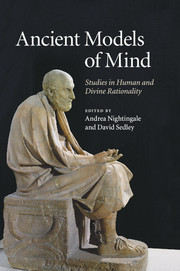Book contents
- Frontmatter
- Contents
- List of contributors
- Introduction
- 1 Plato on aporia and self-knowledge
- 2 Cross-examining happiness: reason and community in Plato's Socratic dialogues
- 3 Inspiration, recollection, and mimēsis in Plato's Phaedrus
- 4 Plato's Theaetetus as an ethical dialogue
- 5 Contemplating divine mind
- 6 Aristotle and the history of skepticism
- 7 Stoic selection: objects, actions, and agents
- 8 Beauty and its relation to goodness in Stoicism
- 9 How dialectical was Stoic dialectic?
- 10 Socrates speaks in Seneca, De vita beata 24–28
- 11 Seneca's Platonism: the soul and its divine origin
- 12 The status of the individual in Plotinus
- A. A. Long: publications 1963–2009
- Bibliography
- Index
10 - Socrates speaks in Seneca, De vita beata 24–28
Published online by Cambridge University Press: 06 December 2010
- Frontmatter
- Contents
- List of contributors
- Introduction
- 1 Plato on aporia and self-knowledge
- 2 Cross-examining happiness: reason and community in Plato's Socratic dialogues
- 3 Inspiration, recollection, and mimēsis in Plato's Phaedrus
- 4 Plato's Theaetetus as an ethical dialogue
- 5 Contemplating divine mind
- 6 Aristotle and the history of skepticism
- 7 Stoic selection: objects, actions, and agents
- 8 Beauty and its relation to goodness in Stoicism
- 9 How dialectical was Stoic dialectic?
- 10 Socrates speaks in Seneca, De vita beata 24–28
- 11 Seneca's Platonism: the soul and its divine origin
- 12 The status of the individual in Plotinus
- A. A. Long: publications 1963–2009
- Bibliography
- Index
Summary
Only once does Socrates say more than a few words in Seneca: in the final chapters of De vita beata, written in 58 ce, when Seneca was at the height of his power and wealth as Nero's adviser. In response to an imagined accuser who asks how it is that someone can study philosophy and be so wealthy (VB 21.1), Seneca has Socrates speak at length, including the following (VB 25.4):
Make me conqueror of all the world. Have that luxurious chariot of Liber carry me in triumph from the rising of the sun all the way to Thebes.…I will be thinking of myself as human precisely when I am greeted by one and all as a god. Then follow this lofty pedestal with a radical transformation. Let me be placed on someone else's float to decorate the procession of a fierce and arrogant conqueror. I will not be carried any more humbly beneath another's chariot than I would if I had stood in my own. So? I nevertheless prefer to conquer than to be captured.
When the text breaks off several chapters later, Socrates is still speaking.
What kind of Socratic voice is this? Below I consider four aspects, partly of the voice itself and partly of the content of the utterance: (1) The voice belongs to a prosopopoeia. (2) Socrates espouses the Stoic doctrine of preferred indifferents. (3) He invokes recognizably Roman examples such as the triumph.
- Type
- Chapter
- Information
- Ancient Models of MindStudies in Human and Divine Rationality, pp. 180 - 195Publisher: Cambridge University PressPrint publication year: 2010
- 3
- Cited by



